Whether you’re preparing for SQE1, SQE2, HRA, BTT or need additional training for your bar exams, our specialised resources are here to guide you every step of the way:
What is a bar exam?
The bar exam or law bar exam is a professional qualification examination for lawyers. After passing a bar exam, you can be granted permission to practice as an advocate and carry out other licensed activities done by legal professionals, e.g. property conveyancing.
Types of practising lawyers in England and Wales
Being a common law jurisdiction, the UK has two types of qualified lawyers: barristers and solicitors of England and Wales. Each has its own rich heritage, with barristers especially having very strong historic roots and traditions, many of which remain relevant, including unique and iconic items of court attire. Part of the primary distinction, historically, has been drawn based upon the specific roles played by these types of lawyers. Solicitors have typically been a more public facing form of legal professional, interacting with clients, preparing legal documents, and managing and facilitating transactions and legal processes. In contrast, barristers, until recently, were largely inaccessible to the general public other than through solicitors and general played advocacy-based roles. The origin of the term barrister itself is reflective of this history, as to be “called to the bar” was to be permitted across the bar that divided the court from the public, though it is now more associated with passing the bar exam.
If you are interested in Higher Rights of Audience, the Bar Course Exam, the Bar Transfer Test, or Bar additional training.

Although both of the above constitute the UK legal professions in England and Wales, each has their own qualification route and regulatory body. Click here to read more on how a barrister can convert to a solicitor.
Under the old regime, the decision between being a barrister and solicitor was to be made after the LLB/GDL course. Upon graduation, future barristers had to undertake a Bar Professional Training Course (BPTC) – vocational training required to pass the bar, while aspiring solicitors had to do a one-year Legal Practice Course (LPC) and a two-year training contract.
That did not contribute to considerable uniformity across the system, as each LPC and BPTC (and equivalent) training provider assessed the law students’ knowledge and skills through its own exams. In addition, there is no single centralised bar exam to qualify as a UK barrister.
In addition, one of the biggest challenges under the former route to qualifying as a solicitor (apart from the financial strains) was perhaps landing a training contract. With a limited number of training contracts, even the highest marks in the LPC transcript did not provide any guarantees. That blocked access to the legal profession to thousands of aspiring solicitors each year.
With the introduction of the Solicitors Qualifying Examination (SQE) as a new centralised bar exam, the LPC requirement for would-be solicitors will soon cease to exist.
However, LPC courses may very well remain a meaningful element of the UK legal education system – for those who don’t mind the tuition fees involved. Click here to read more on the implications of the SQE exam for LPC graduates.
The SQE introduction in 2021 will have no such consequences for the BPTC. Being regulated by the Bar Standards Board, UK barristers do not have the SRA as their professional body. At the same time, the superexam may offer a new opportunity for barristers to convert to the qualification of the solicitor of England and Wales. Though not being entitled to agreed exemptions as barristers, they can certainly try applying for individual exemptions.
UK SQE exams for aspiring solicitors
Starting from September 2021, the UK has a single standardised solicitor’s bar exam for all future solicitors – the Solicitors Qualifying Examination (SQE). The situation with no single bar examination for solicitors is now history. The SQE exam consists out of two stages:
- SQE 1 – multiple choice test – read more how to prepare for the SQE1; and
- SQE 2 – skills-based set of exams – read more how to prepare for the SQE2 exam.
Historically, there were several solicitors’ UK bar exams or equivalents:
- Qualified Lawyer Transfer Test (QLTT) – on 1 September 2010 was replaced by QLTS.
- Qualified Lawyer Transfer Scheme (also known as the QLTS exam) – the outgoing UK bar exam for foreign qualified lawyers who are already admitted in their home jurisdictions and wish to convert their qualification to practice as UK solicitors (replaced by the SQE in 2021 – please see below).
- Solicitors Qualifying Examination (also known as the SQE exam or “super exam”) – the newly-introduced common or single route to qualify as a solicitor of England and Wales. Having replaced the QLTS in September 2021, this is now the only UK bar examination for solicitors.
- Yet another UK bar examination is known as Higher Rights of Audience (HRA). Passing this exam gives already-qualified solicitors the possibility to practice law in the same courts as barristers.
Solicitors’ bar exams structure
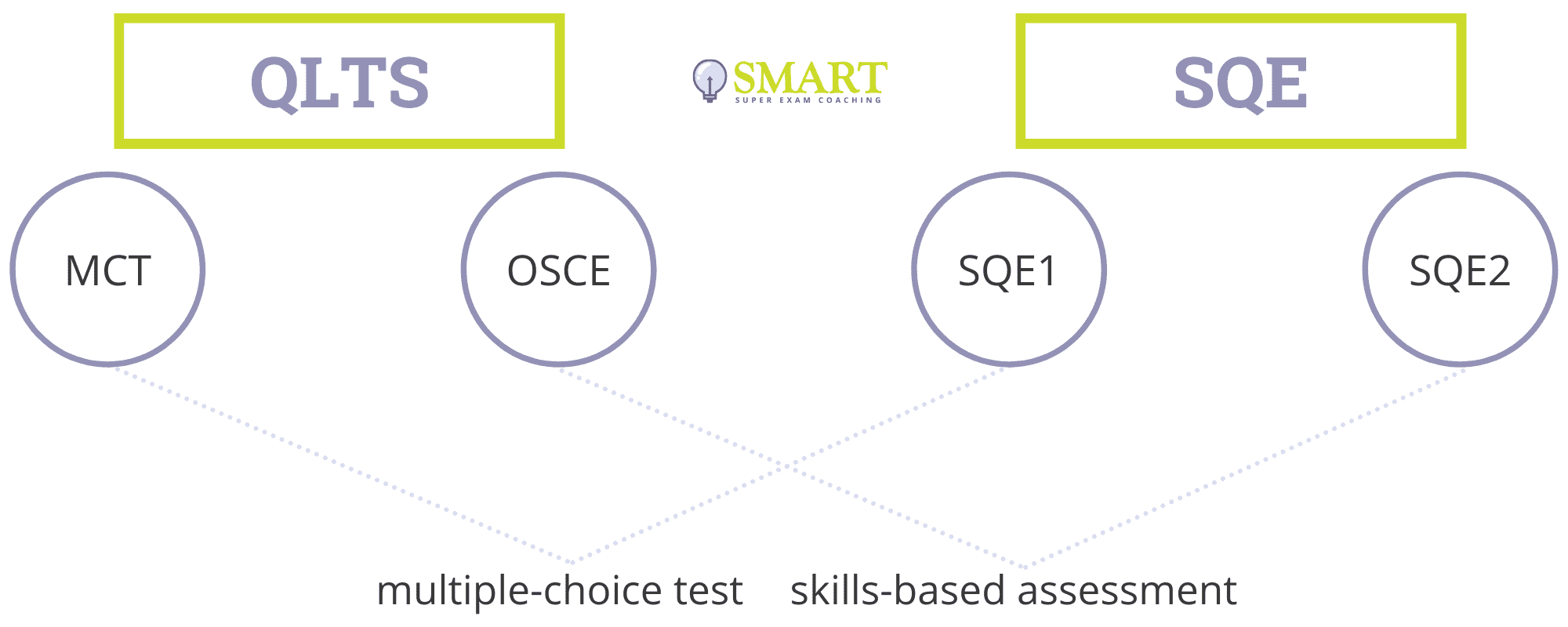
The new SQE is clearly rooted in the QLTS exam. Both the QLTS and SQE are modelled on the Miller Pyramid and seek to assess not only knowledge as the lower-level value, but more importantly skills as values of a higher level.
SQE and QLTS are two-stage assessments, with stage 1 being a multiple-choice test (for both SQE1 and QLTS MCT). At the same time, the two assessments are in no way identical. The major difference lies in the assessment range of the SQE stage 1 and the MCT component of the QLTS. The SQE1 and SQE2 both cover the same subjects included in “functional legal knowledge” – which is not the case with the QLTS.
Unlike the SQE, part 2 of the QLTS (called OSCE – Objective Structured Clinical Examination) assesses the candidates’ knowledge and skills in such areas of law as business, property and probate, criminal and civil litigation – which are outside the range assessed by the QLTS MCT. Also, one element of the OSCE – oral presentation – has been converted into case and matter analysis for the SQE2 written assessment.
For stage 2 of both UK bar exams – SQE and QLTS, a distinctive feature is an equal focus on practical legal skills as well as knowledge of law. Both SQE2 and QLTS OSCE are skills-based simulated assessments aimed at testing various practical competences the candidate is required to have in actual legal practice, e.g. conducting a client interview, writing a letter to a client, carrying out legal research, etc. Learn more about the new solicitor bar exam in the UK here https://superexam.uk/sqe/.
If you’re preparing for the SQE1 or SQE2, having a structured study plan and the right training is essential for success. We offer comprehensive preparation courses designed to equip candidates with the knowledge and skills needed to pass both stages of the Solicitors Qualifying Examination (SQE).
Coaching for SQE1 and SQE2
SQE1 Preparation: Our SQE1 Course provides:
✅ Extensive multiple-choice question (MCQ) practice for FLK1 and FLK2
✅ Pre-recorded lectures covering all examinable topics
✅ Live law revision sessions and tutor support
SQE2 Preparation: Our SQE2 Course includes:
✅ 1-to-1 mock exams with personalised feedback
✅ Legal Theatre® group mock sessions for advocacy and interviewing
✅ Comprehensive training in legal writing, research, and case analysis
📌 Access Our Free Webinars on SQE1 & SQE2
We offer free webinars to help you better understand the exam structure and key preparation strategies. These are available on our SUPERexam platform – access the schedule of upcoming SQE live sessions.
Enhance your preparation with structured courses, mock exams, and expert-led webinars to maximise your success in the SQE!
UK Solicitors’ exams contents
| SQE1 Law (current) | QLTS MCT Law (precursor) |
|
|
| SQE2 Skills |
| QLTS OSCE Skills |
|
| QLTS OSCE Law |
|
How much is theSolicitors’ UK bar exam cost?
| SQE1 bar exam fee | QLTS MCT bar exam fee |
| £1,888 | £588 + VAT |
| SQE2 bar exam price | QLTS OSCE bar exam price |
| £2,766 | £3,042 +VAT |
UKSolicitors’ bar exam questions
| SQE1 | QLTS MCT |
| Click to access SQE1 sample questions | Click to access QLTS MCT sample questions |
| SQE2 | QLTS OSCE |
| Click to access SQE2 sample questions | Click to access QLTS OSCE sample questions |
UKSolicitors’ bar exam books and manuals
| SQE |
| SQE Prep & Practise from Oxford University Press (OUP)
SQE Answered guides |
Solicitors’ UK bar exam requirements
SQE exam:
- Obtain an undergraduate degree in any subject (it does not need to be a law degree), or equivalent qualification or apprenticeship
- Pass SQE1 and SQE2
- Complete two years of Qualifying Work Experience (QWE)
- Meet character and suitability requirements.
QLTS exam: no longer available
- As this is a UK bar exam for foreign lawyers, you must be a foreign qualified lawyer within at least one of the recognised jurisdictions
- Pass QLTS MCT and QLTS OSCE
- Meet character and suitability requirements
- Apply for admission with the given deadline.
Taking theSolicitors’ UK bar exam
| Solicitor Qualifying Exam | QLTS exam |
| SQE1 – available to sit domestically and internationally via Pearson VUE test centres
SQE2 written – available to sit domestically and internationally via Pearson VUE test centres SQE2 oral – at the beginning will be available at several locations, but within the UK | QLTS MCT – available to sit domestically and internationally via Pearson VUE test centres
QLTS OSCE – available to sit in London |
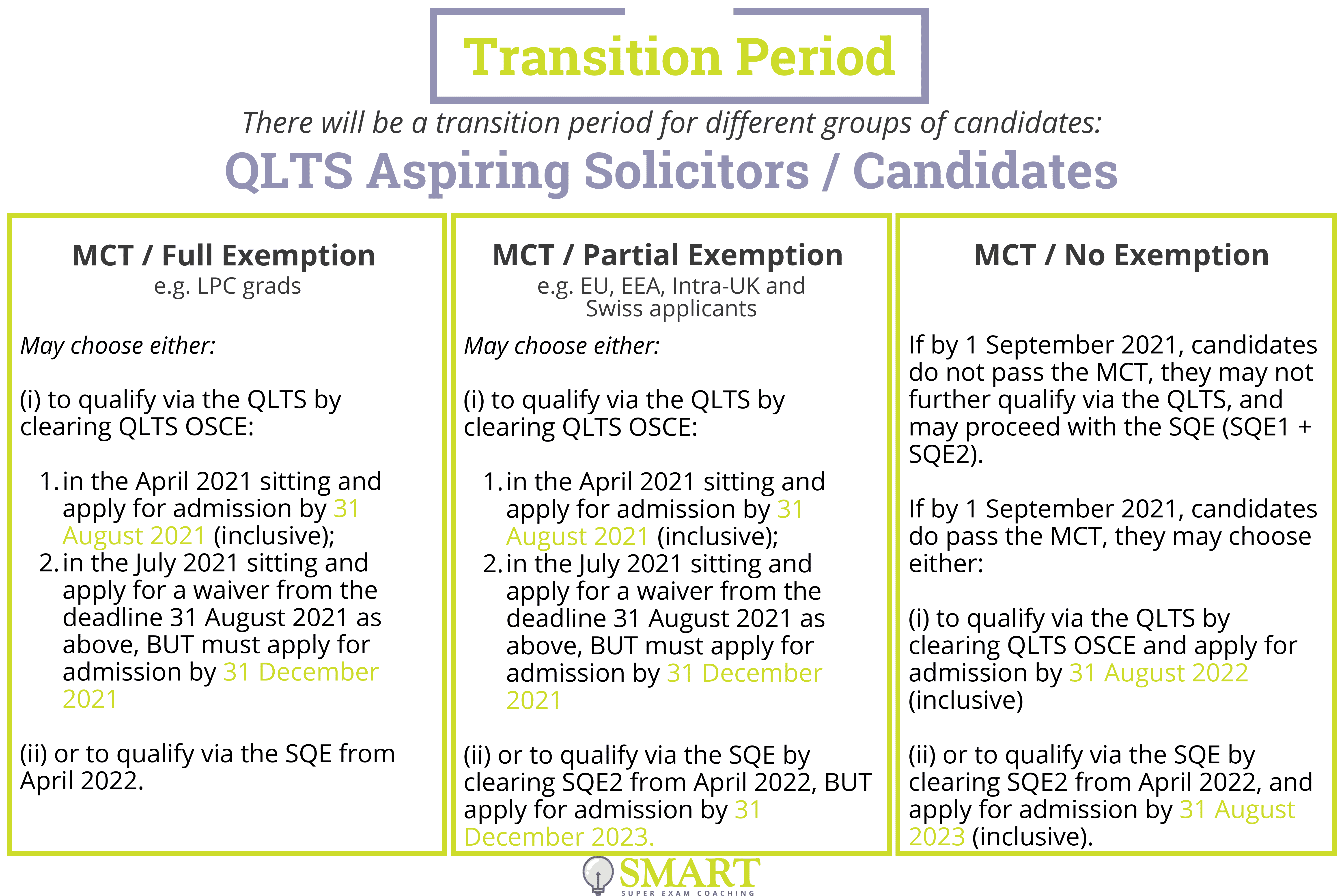
UK bar exams for aspiring barristers
Formerly, the standard vocational course and UK bar assessments required to become a barrister in the UK, the BPTC, was replaced in September 2020 by a range of bar professional training courses with different costs, names and study material. In other words, the UK bar training exams are not centralised anymore. This change to the UK bar assessments and studies was made by the BSB to diversify the vocational aspects of barristers’ qualifications. The BSB does, however, have to approve the bar training course structure and its contents. This is different to the SQE courses where the providers’ bar professional training studies, including the courses, content and methodology, are not approved by a governing body. The SQE exams only are standardised.
Each bar professional training course must cover the subject areas of:
- Civil Litigation
- Criminal Litigation
- Evidence and Sentencing
- Opinion Writing
- Professional Ethics
- Legal Research
- Drafting and Conference Skills
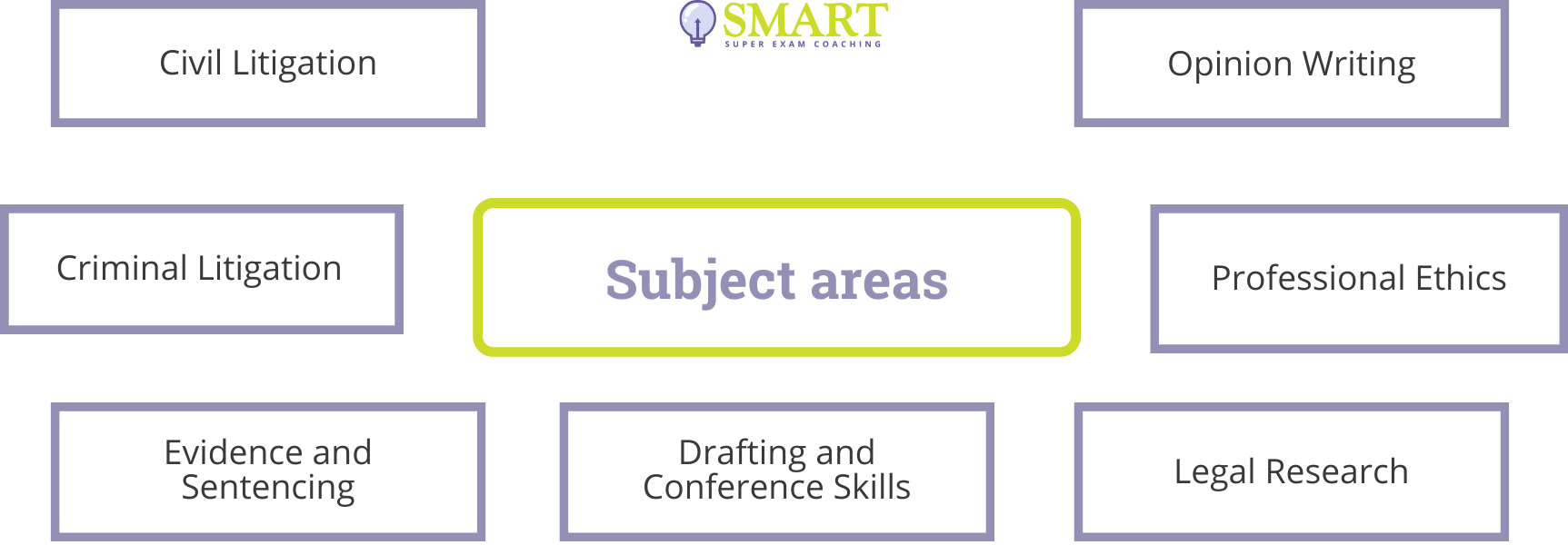
The UK law schools assess them through direct administration of the respective bar training exams.
Passing the bar exam for aspiring barristers is a lengthy and demanding process that should not be taken on lightly as only those who persevere and get very high marks usually make it through to the end.
The bar training course structure and exams involves three stages:
The first stage of the bar training course consists of a series of core courses that cover the seven subject areas mentioned above. These courses are designed to give students a good foundation of knowledge and understanding of the law before they move onto the second stage. The second stage consists of optional courses that allow students to specialise in a particular area of law. At this stage, students can also choose to take additional elective courses in order to gain a better understanding of a particular legal field. The third stage is the pupilage, which also includes rigorous and comprehensive assessments of a student’s knowledge and skills. The bar exam consists of a series of written questions and practical exams in order to test a student’s mastery of the law. Upon successful completion of the bar exam, students are eligible to be admitted to the bar and practice law as a UK barrister.
Let’s more in details consider the barrister pathway:
- Academic stage
- Vocational stage
- Work-based learning

Academic stage
Firstly, students need to apply to join a bar training course. This can be challenging due to the requirements to be admitted being quite lengthy. To progress to the vocational component, candidates must obtain a 2:2 (although some require 2:1) in a law degree that qualifies. Alternatively, the future barristers may come from very different study backgrounds and will then have to complete their non-law degree followed by the Graduate Diploma in Law (GDL), a law conversion course. By the way, one of the most famous English judges – Lord Denning (Tom Denning, Baron Denning) first was a mathematician and only later he decided to become a barrister and studied jurisprudence. He passed all the UK bar assessments with exceptional marks and often impressed the assessors.
Lord Denning’s success proves that it is possible to switch from a non-legal academic background to a legal profession. After completing the GDL, prospective barristers take a bar course that may be called very differently: Bar Training Course (BTC) or Bar Professional Course (BPC) or BPTC (Bar Professional Training Course). The BTC, BPC or BPTC is a one-year full-time course or two-year part-time course designed to give candidates the skills and knowledge they need to practise as a barrister. After successful completion of the bar course, the aspiring barrister is required to undertake a pupillage, which is a 12-month period of supervised practice. After successful completion of the pupillage, the barrister can apply for a practising certificate and begin their legal career.
Vocational stage
The vocational component of the bar professional training studies requires candidates to complete a postgraduate bar course and earn a postgraduate diploma. The bar course and bar professional course exams (BPC exams) provide candidates with training in the essential skills of a barrister. An example is the Professional Ethics exam which many of the bar course students think is one of the most difficult among the bar professional course exams (BPC exams). The pupillage ethics exam is compulsory for those who started the Bar Training from 2020 onwards. From August 2021 it also applies to those who cleared the Bar Transfer Test.
Advocacy is another one of the skills learnt during this phase, along with case preparation and analysis, legal research and opinion writing, drafting of the case documents and conference skills.
The bar exams require a prospective barrister to demonstrate their knowledge in various areas. These include Civil Litigation and Criminal Litigation, Practice Management and Accounts, Professional Conduct, Drafting, Advocacy, and Legal Research.
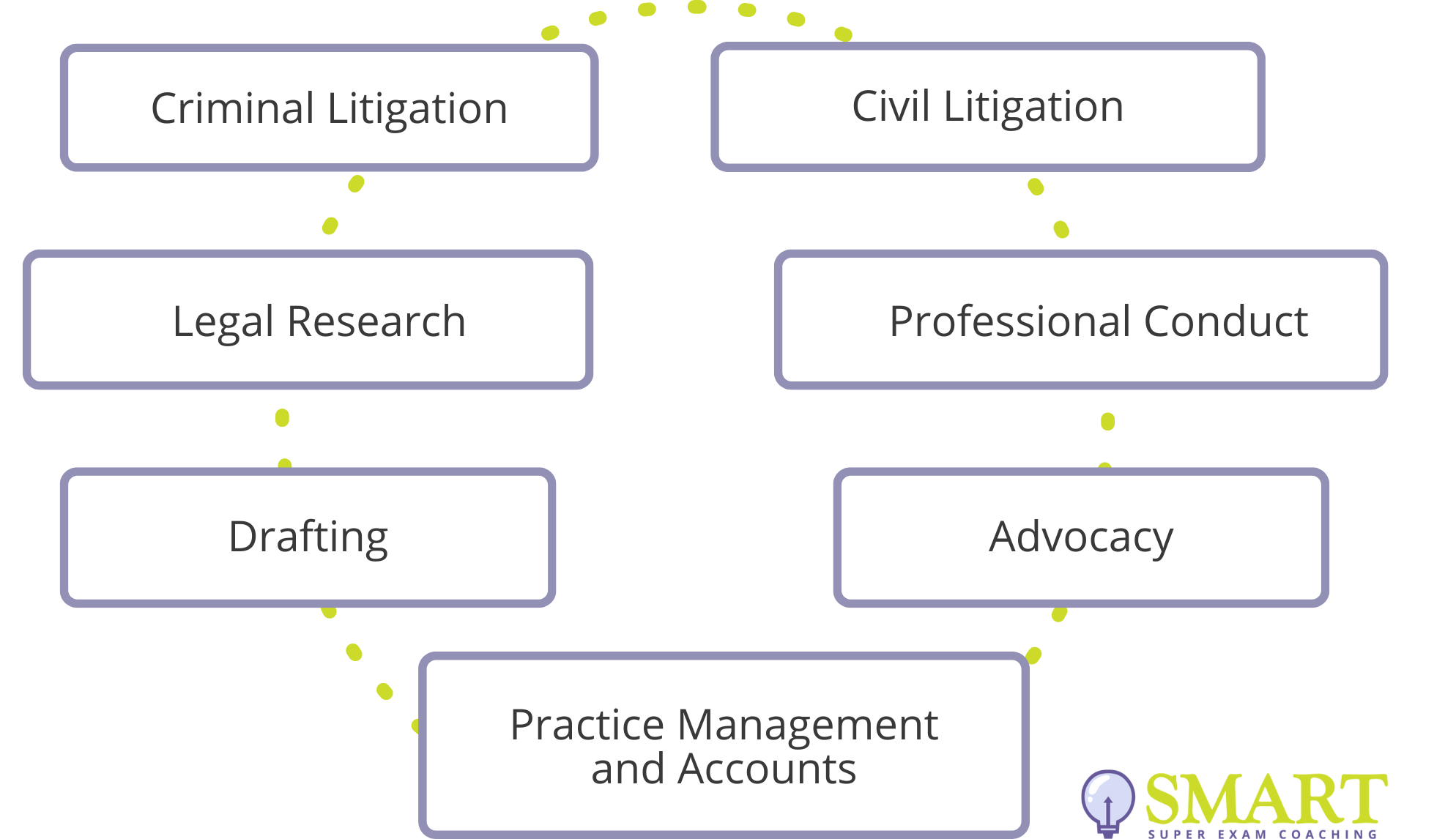
Each exam is designed to test the individual’s knowledge and skills in the relevant area. It also includes a number of written assessments which assess the individual’s ability to think critically and analytically.
Candidates must also join one of four Inns of Court (Gray’s Inn, Lincoln’s Inn, Inner Temple, or Middle Temple) before starting the bar course and doing the bar training exams.
Work-based learning
As mentioned before, the bar exam for aspiring barristers requires 3 areas of learning. The third stage, the work-based learning component, also known as pupillage, involves shadowing a practising barrister. The aspiring barrister at this stage becomes a pupil barrister or sometimes called “baby barrister” and will work on real cases in a junior capacity, helping experienced barristers. Being accepted into a pupillage can be daunting due to it being highly sought after and having only a few positions available.
A statistic published by the Bar Council in late 2022 shows that only one in ten first-time applicants get an offer for pupillage.
The pupillage period typically lasts for a year and involves attending court and taking instructions from clients. Barristers may also undertake legal research and write opinions on legal matters. For this reason the knowledge and skills obtained during the bar course are paramount. The is a vocational course that teaches future barristers the skills they will need to be a pupil and later to work as an independent advocate. Once all the stages are they can then apply to be called to the Bar and become a fully qualified barrister.
During the pupillage phase, aspiring barristers also need to complete ten ‘qualifying sessions’ which have to cover a list of subjects, of which at least two require preparation to be done beforehand and that need to be interactive: Ethics exam, Equality, Diversity and Inclusion, Standards and Values, Preparation for Pupillage, Advocacy skills, Career Development and Wellbeing, Legal knowledge, Justice and Rule of Law
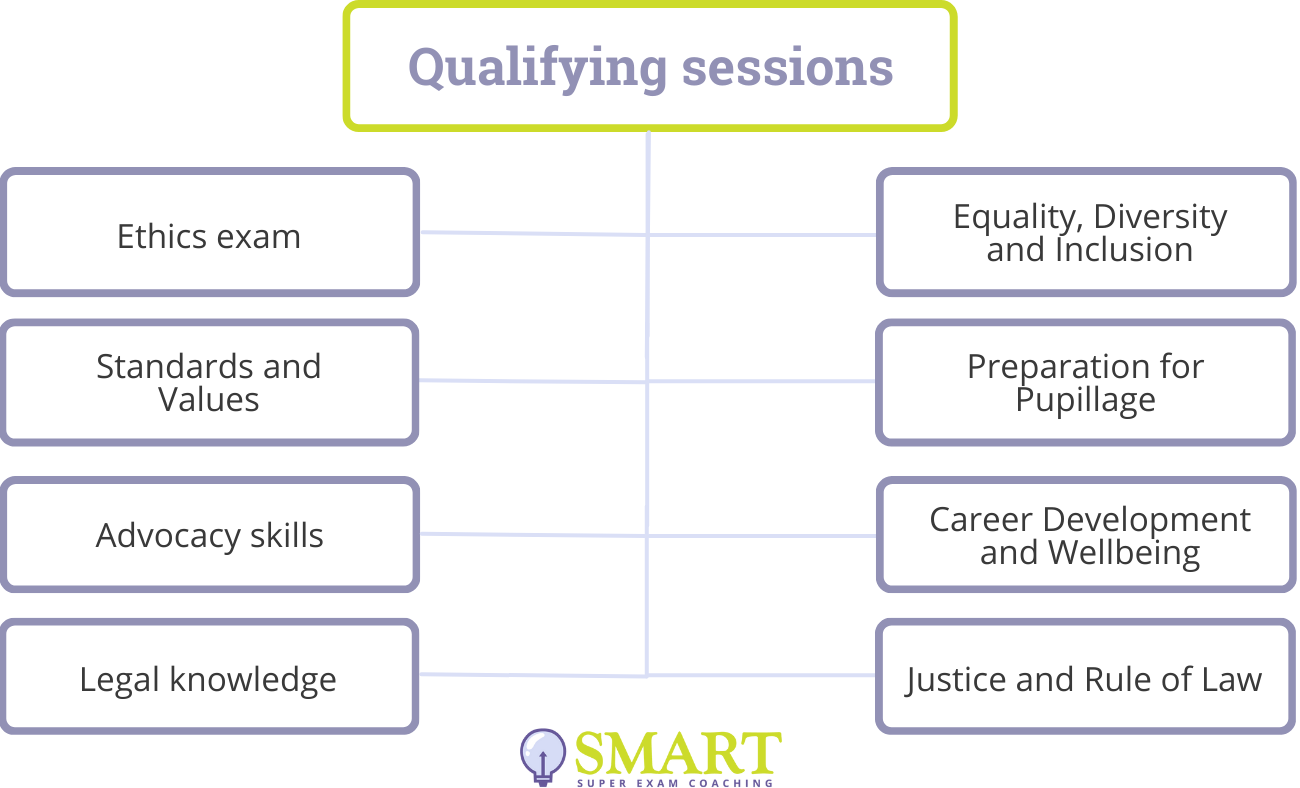
The pupillage period is also an opportunity for the aspiring barrister to gain experience in the field by working on real cases and developing important practical skills. Once the pupillage period is complete, the aspiring barrister can then apply to become a fully-fledged barrister.
There are four different barrister pathways an aspiring barrister could follow to qualify. These are:
- the three-step route,
- four-step route,
- integrated route
- apprenticeship route.
The Bar Transfer Test (BTT) is a transfer scheme for the qualified lawyers (foreign qualified or solicitors in England and Wales) to be admitted to the Bar of England and Wales, without the full studies that are required otherwise: Academic stage (Qualifying Law Degree or conversion course) and the Cocational stage (BTC, BPC or BPTC). The BTT assessments consist of:
Professional Ethics, Civil Litigation, Criminal Litigation, Advocacy, Opinion Writing, Drafting, Conference Skills and Legal Research.
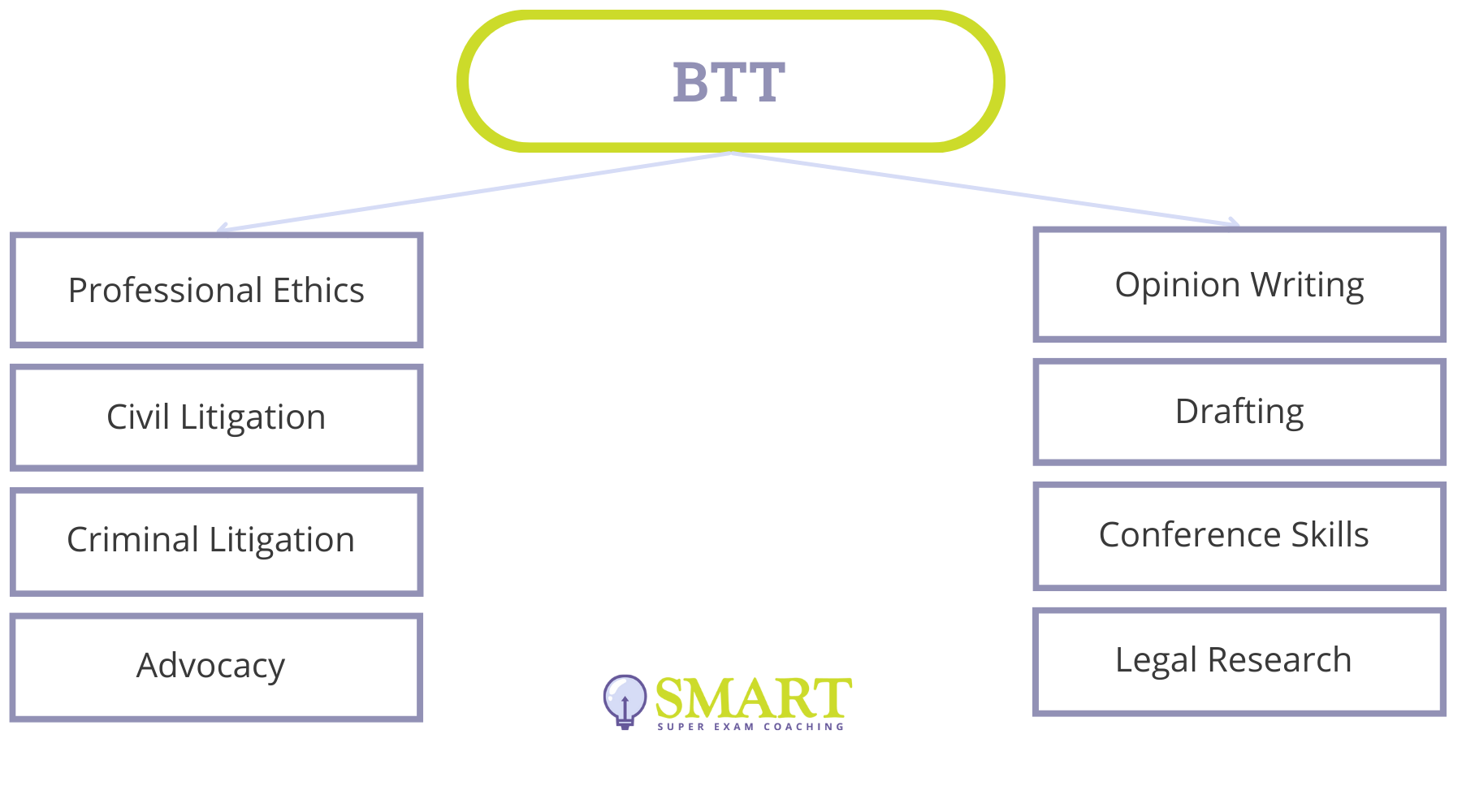
As it was outlined above, first the aspiring barristers are required to pass a bar course which covers a range of topics including criminal law, family law, European law, and civil law. Those courses also prepare aspiring barristers for the practical aspects of life at the Bar, such as the Barristers’ Code of Conduct, the Barristers’ Chambers’ Code of Practice, and the Barristers’ Professional Conduct Rules. Upon successful completion of the bar course, aspiring barristers will have earned the right to join the Bar, allowing them to practise as a barrister.
Additional Training for the Bar Exams
If you’re preparing for the UK Bar Exam, securing strong advocacy and cross-examination skills is essential for success. To support candidates, we offer specialised training for the Bar Course, Higher Rights of Audience (HRA), and Bar Transfer Test (BTT), tailored to enhance performance in cross-examination assessments and advocacy exercises.
Our training includes:
✅ Expert-led lectures covering key advocacy techniques
✅ Practical mock sessions simulating real exam conditions
✅ Personalised coaching from experienced legal professionals
It is so well written. I got everything i was looking for
What mean 2:2 although some require 2:1 in law degree they qualify